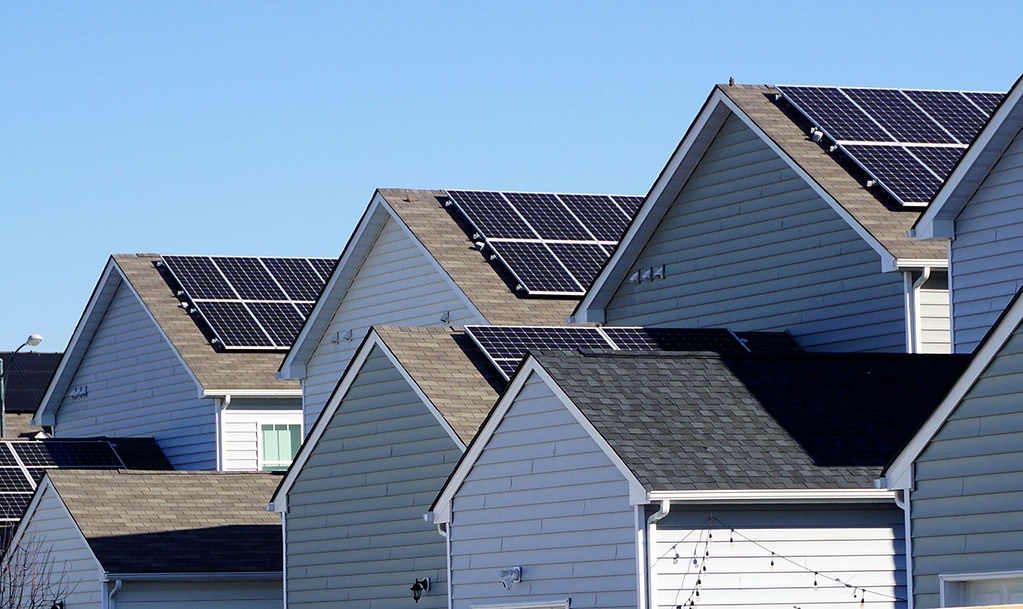INSTITUTE INDEX: The South's utilities are still trying to thwart rooftop solar

Installing solar panels on rooftops would make less sense financially under state policies being promoted by major electric utilities in the South. (Photo of rooftop solar arrays in Richmond, Virginia, by Jeffrey Knight/VCU Capital News Service via Flickr.)
(This index was updated on March 25 to include the number of organizations supporting Duke Energy's North Carolina plan.)
Number of North Carolina solar companies that wrote an open letter to Gov. Roy Cooper this month asking him to block Duke Energy's proposal to change state rules on net metering — an accounting system that allows customers with solar panels to earn credit for the electricity they produce but don't use and send back to the grid — in a way that would make installing rooftop solar systems less financially viable, particularly for low- and middle-income households: 17
Number of nonprofits that are also opposing Duke Energy's proposal, which is now under consideration by the North Carolina Utilities Commission: over 50
Number of organizations — including environmental nonprofits, trade associations, and solar companies — that are supporting Duke Energy's proposal: 6
If the commission approves the proposal Duke Energy submitted last November, percent by which it would reduce the value of adding solar panels to a home, according to an analysis of the company's own data by an engineer with climate justice group NCWARN: 30
Extra monthly fee that Duke's proposal would also require rooftop solar owners to pay, while reducing the credit they get for producing more energy than their household needs: $10
In Florida, date on which the legislature passed a bill originally drafted by NextEra Energy-owned Florida Power & Light to change net metering rules in ways that will hurt the state's rooftop solar industry, including crediting energy sold to the grid below retail rates and adding new charges and fees — a measure solar advocates are calling on Gov. Ron DeSantis (R) to veto: 3/7/2022
Year in which Florida Power & Light worked with secret-money political committees to help secure Republican control of the state Senate, after which it asked Republican state Sen. Jennifer Bradley to sponsor the bill to change net metering rules: 2020
Amount Florida Power & Light then contributed to Bradley's campaign: $10,000
Under Florida's current net metering rules, average number of years it takes for customers to pay off loans for installing rooftop solar systems: 11 to 14
Estimated number of years the legislation would add to that: 5 to 8
In Virginia, minimum monthly bill Dominion Energy wants to charge consumers who sign up for a new community solar program allowing multiple households to purchase a portion of the energy generated by a solar array — a charge that advocates say would seriously undermine the program: $55
Rank of that proposed charge among the highest such charges in the nation: 1
Year in which Environment America released a report documenting how utilities including Duke Energy, Florida Power & Light, and Dominion have been working to thwart rooftop solar alongside Koch Industries, the American Legislative Exchange Council, the Consumer Energy Alliance, and other groups with fossil fuel ties: 2021
According to a 2020 poll, percent of Americans who say that developing non-fossil fuel energy sources, including solar and wind, should be the nation's top energy priority: 79
If coal were replaced by solar panels in the U.S., number of lives that could be saved annually by pollution reductions: 52,000
Degrees Celsius to which the 2015 Paris Climate Accords aim to limit the Earth's warming — a goal the head of the United Nations recently said is "on life support" while calling for urgent action: 1.5
(Click on figure to go to source.)
Tags
Sue Sturgis
Sue is the former editorial director of Facing South and the Institute for Southern Studies.
